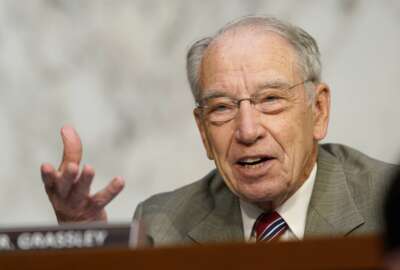The Morning Federal Newscast is a daily compilation of the stories you hear Federal Drive hosts Tom Temin and Emily Kopp discuss throughout the show each day. The Newscast is designed to give FederalNewsRadio.com users more information about the stories you hear on the air.
- Maybe it’s because of his avowed desire for transparency. Or maybe it’s the bipartisan quality of the bill. But President Obama has signed a law requiring the administration to provide Congress with a list of sequester budget cuts. Should sequestration occur in January, the executive branch would need to make an immediate $110 billion reduction in 2013 spending. The new law imposes a Sept. 6 deadline for the report. Sequestration became law last year when a bipartisan Congressional committee couldn’t agree on a deficit- reduction plan. (Federal News Radio)
- The Federal Aviation Administration has banned a procedure that nearly caused a mid-air collision over Northern Virginia last week. It bars all airports from letting planes land and take off in opposite directions. The procedure has been necessary when changing weather requires a reversal in approach patterns. The ban is temporary until FAA officials can work out a standard, national procedure for all airports to use. In the Reagan National Airport incident, not all of the controllers and pilots involved knew what was going on. (Federal News Radio)
- The White House is asking a district court to dismiss a lawsuit by a homeless advocacy organization over the disclosure of information about unused federal buildings. The National Law Center on Homelessness and Poverty is suing the Office of Management and Budget to get the agency to release more documentation about surplus federal properties, including some that may not have been reported. The Washington Post reports OMB submitted a motion to the district court in Washington rejecting the lawsuit’s claims, saying no documents have been improperly withheld and Acting OMB Director Jeff Zients is the improper defendant. (Washington Post)
- The Social Security Administration is offering early retirements to 9,000 employees. That’s nearly 14 percent of its workforce. Federal Times reports anyone accepting the offer has until Sept. 30 to retire. It isn’t a buyout offer. To qualify, an employee must be at least 50 years old and have 20 years of service. Civil Service Retirement System employees must have served at least two years in a CSRS position before being eligible. The agency didn’t say how many employees it expects to take up the offer, or how many it wants to. (Federal Times)
- The Nuclear Regulatory Commission says it will stop issuing licenses for nuclear plants. The Wall Street Journal reports, that’s because of a recent federal appeals court decision. The case involves nuclear waste. The NRC can issue permits when it has confidence there will eventually be places to store the waste. But the Obama administration, working through Senate Majority Leader Harry Reid (D-Nev.), killed the program to build a national waste repository in Nevada. The court struck down the NRC’s finding that it could still have reasonable assurance of a future storage site. The ruling casts new doubt on whether the U.S. will ever expand its nuclear generating capacity. (Wall Street Journal)
- The Homeland Security Department wants an economical way to link local public safety networks into a nationwide system. It sets aside $8 million in research funding. The project is called Next Generation Tactical Wireless Broadband. DHS envisions a system that lets first responders share video, biometric information, database searches and voice communications. And it wants devices that can be programmed wirelessly. Proposals are due in November. The department plans to conduct field demonstrations after that. (DHS)
- Two lawmakers want to bring the cloud into a 26-year-old privacy law. Congressmen Jerrold Nadler (D-N.Y.) and John Conyers (D-Mich.) want the Electronic Communications Privacy Act to address current technology trends. The Electronic Communications Privacy Act Modernization Act of 2012 would require the government to obtain a search warrant demonstrating probable cause anytime it seeks the contents of electronic communications. The bill also would provide a uniform standard and set notice rules for the government accessing emails or other electronic communications. Many of the major telecommunications and technology companies support this approach. (Nadler press release)
Copyright
© 2024 Federal News Network. All rights reserved. This website is not intended for users located within the European Economic Area.




